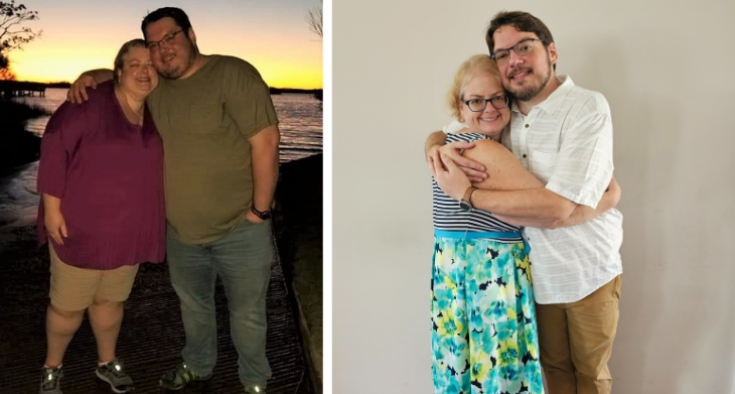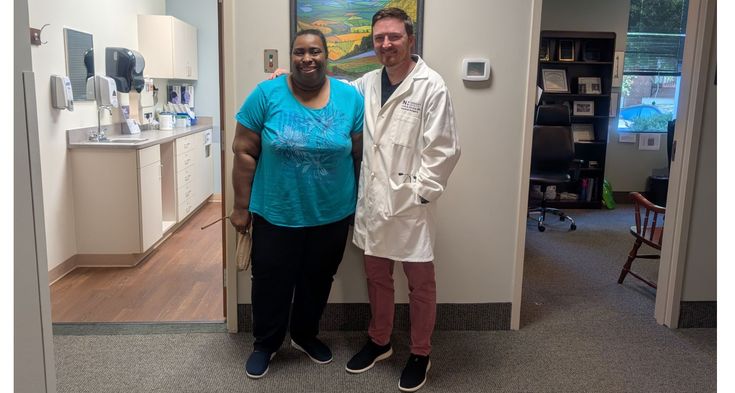Medicine is always evolving.
So, Dr. David Voellinger, weight-loss surgeon and lead physician at Novant Health Bariatric Solutions in Charlotte, wasn’t surprised that in 2024, for the first time ever, his clinic had more medical patients than surgical patients.
“Surgery is what I was initially trained to do,” he said, “but I learned early on that obesity is a disease with a lot of different factors involved and that surgery alone isn’t enough.”
Beyond bariatric surgery, drugs such as Ozempic, Wegovy, Zepbound and other GLP-1 medications have revolutionized weight loss. But those options aren’t right for everybody. Some people can’t tolerate the side effects, have complications, can’t afford the medication or don’t want to be on a prescription for the rest of their lives.
That’s where integrative medicine comes in; it’s built around holistic care and lifestyle changes to help people meet their goals.
Find a weight-loss solution that's right for you
“We needed a different approach for some patients,” Voellinger said. So he and nurse practitioner Shannon McNeill researched and took classes with national leaders in integrative and functional medicine, including Dr. Andrew Weil and Dr. Mark Hyman. Today their clinic offers nonsurgical therapy as part of its multidisciplinary obesity weight management program and as a standalone. (See more on this in the box below.)
McNeill calls the integrative approach “the future of medicine.”
Lifestyle modification, a key feature of integrative medicine, is ideal for “folks who don't want pharmaceuticals or surgery,” said Voellinger, “and those who’ve tried, but can’t tolerate or afford GLP-1s.” Some people experience such extreme side effects on GLP-1s – severe nausea, vomiting, diarrhea and, in rare cases, pancreatitis and gallbladder issues – that they simply can’t stay on them.
Even some patients who tolerate the drugs well have seen their insurance companies drop coverage, putting these medicines out of reach.
Lifestyle changes for weight-loss: Slow and steady
Lifestyle changes don’t yield immediate results. They take time, and that’s to the patient’s advantage.
People who lose weight at a gradual, steady pace – about 1 to 2 pounds a week – are more likely to keep the weight off than people who lose weight quicker, according to the Centers for Disease Control and Prevention (CDC).
Voellinger cautions that there’s no such thing as instant gratification when it comes to weight loss – no matter which path you choose. Crash diets aren’t effective over the long haul. He advises patients not to focus on body aesthetics or short-term fixes. “Obesity is a chronic, lifelong, relapsing disease,” he said. “The foundation of everything we do is lifestyle management: nutrition, exercise, behavior modification, stress management, sleep hygiene.”
Patients who choose the integrative route can expect to lose about 5% of their total weight in the first three months, although many patients lose more, said Voellinger.
As effective as integrative medicine can be, bariatric surgery is the gold standard for many patients. “It gives you the most weight loss and the least chance of regain,” Voellinger said.
Once a patient has reached their goal weight, they’re in maintenance mode and come for office visits less frequently. But keeping weight off requires an ongoing commitment. Voellinger said, “People are less likely to regain weight when they have regular check-ins.”
Getting down to a healthy weight goes well beyond dropping a few dress sizes or the antiquated idea of getting your body ready for “bikini season.” Losing weight can help manage chronic diseases like high blood pressure, Type 2 diabetes, heart disease, fatty liver disease, sleep apnea and joint pain, Voellinger noted.
And an integrative approach to weight loss is healthy, effective and – unlike surgery and medications – comes without many of the risks or unpleasant side effects. As much as medicine has evolved to include high-tech approaches, sometimes it’s the old-fashioned route that yields the greatest rewards.
Novant Health Bariatric Solutions in Charlotte offers a tried-and-true approach to weight loss – one that doesn’t involve surgery or medication
Weight-loss surgeon and bariatrician Dr. David Voellinger, lead physician at Novant Health Bariatric Solutions in Charlotte, doesn’t mind not operating.
He wants to help patients reach a healthy weight, no matter how they choose to get there. So, his practice has expanded to include nonsurgical treatments for weight loss under the umbrella of integrative medicine, which focuses on holistic and lifestyle solutions to a variety of medical issues.

The program’s focus is on nutrition, exercise, mental health (now called “behavioral health” in the medical field), sleep hygiene and, sometimes, supplements, although Voellinger counsels patients that they aren’t FDA-approved. Calcium with vitamin D, turmeric or milk thistle might be recommended for general wellness. And some people find melatonin, magnesium or chamomile to be effective sleep aids.
Voellinger, who’s also adjunct assistant professor of surgery at UNC’s School of Medicine and credentialed in culinary nutrition, and nurse practitioner Shannon McNeill have been leading select patients through an integrative program for several years, but now they’ve formalized it with McNeill serving as the primary clinician.
The program is open to people of all ages – from age 13 through mid-70s. In general, the program is open to anyone with obesity, typically defined as a body mass index (BMI) of greater than 30. Both men and women have taken part, but the program has so far skewed mostly female. And that suits McNeill; women's health is her primary clinical interest.
“The majority of my days are spent with women struggling with perimenopause or menopause,” she said. “And those can affect sleep and cause insulin resistance and weight gain. A lot of women tell me they feel lost. We’re here to guide them.”
Regular check-ins are key to success. “We assess patients’ progress at least every three months,” Voellinger said. “If we discover we need to be more aggressive, we’ll revise our approach.”
With lifestyle changes and under Voellinger’s or McNeill’s guidance, patients have lost anywhere from 30 to 60 pounds on average. And that’s without surgery or pharmaceuticals.
What to expect at Novant Health Bariatric Solutions
On a first visit, patients can expect to discuss the weight-loss strategies they’ve tried. They may need lab work to determine if there are underlying hormonal issues.
They’ll initially meet with McNeill or Voellinger, but they’ll likely meet other providers – a dietitian or personal trainer, for instance – during their weight-loss journey. On-site behavioral counselors are available for patients who want to try mindfulness, breathing exercises or guided meditation.
Patients may also get referrals to a chiropractor, massage therapist, acupuncturist or reflexologist.
Not all patients in the program are using the integrative approach as a standalone. While some plan to avoid surgery and/or medications altogether, others are also on a GLP-1 or other medication. And some are trying to lose weight before surgery to ensure the best outcome.
One size doesn’t fit all
Individual nutrition plans are entirely customized to each patient. The Mediterranean diet (which is plant-based and heavy on fruits, vegetables, whole grains, olive oil and fish) is a good, general approach to healthy eating, and plenty of doctors endorse it. But it’s not ideal for everyone.
Integrative practitioners customize healthy eating plans for each patient. They can range from a low-calorie diet to an anti-inflammatory diet (for someone with joint pain or fibromyalgia) to a low-glycemic diet (for someone who’s prediabetic). If the team suspects a gluten or dairy issue, they might start with an elimination diet.
Exercise is a crucial component of any weight-loss plan – holistic or otherwise.
In the integrative program, exercise plans are customized for each patient, Voellinger said. While a general guideline is five days of cardio and two days of strength training each week, an integrative approach is personalized and may include balance, flexibility, yoga, tai chi and/or pilates.
The program is done individually, but Voellinger and McNeill are considering adding a group support element and/or remote patient monitoring down the road. (That’s a program Voellinger’s clinic piloted in which the clinical team serves as an “accountability partner.” The patient does the work, but they’re connected 24/7, via an app, to a nurse who can answer questions and offer support.) In addition, the clinic offers virtual visits, which Voellinger calls “a huge patient satisfier.”
Voellinger and team were early adopters in using lifestyle medicine to treat obesity. “We were the first in Charlotte to have a true, multidisciplinary program,” he said. “But, formalizing the integrative component is really exciting. No matter which method someone chooses for weight loss, we’ve got them covered.”
Click here to make an appointment at Novant Health Bariatric Solutions in Charlotte.

















